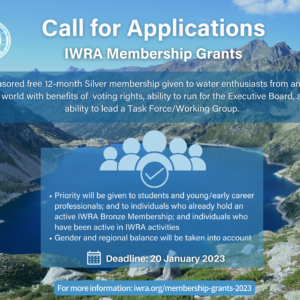Special issue in Water International
The OECD Principles on Water Governance as a means to an end: how to measure impacts of water governance?
Abstract Submission deadline: 6 September 2021

Rationale
Effective, efficient and inclusive water governance is key to guarantee enhanced water security and better access to safe drinking water and sanitation services. The OECD Principles on Water Governance, adopted in 2015, argue that good governance is a means to an end and that public policy responses will only be viable if they are consistent, if stakeholders are properly engaged, if well-designed regulatory frameworks are in place, if information is adequate and accessible, and in case of sufficient capacity, integrity and transparency.
In this quest for better water policies, the attention towards quantitative analyses to assess the tangible impacts of water governance has increased over time, alongside water indicators and measurement frameworks. Literature on water governance indicators make a clear distinction between input, output, outcome and impact indicators[1]. Impact indicators usually measure long-term results relating to improved health, environmental conditions, and social wellbeing. However, the literature on the impacts of good water governance remains scarce. This gap is partly explained by the fact that impact indicators are not widely used in practice because of the difficulty to identify universal and cohesive units of measurement of impacts; because of their lack of adaptability to different contexts and policies; and due to the fact that impacts are influenced by several factors including external conditions (e.g., climate change) and other governance dynamics.
[1] Input indicators monitor actions contributing to the achievement of outcomes (e.g. public consultation in planning and budgeting), output indicators monitor results in terms of quality or quantity of products and services(e.g. number of wastewater treatment plants built, volume of water produced), and outcome indicators measure short-medium term results out of such outputs(e.g. % of people with access to water services).
The scope of the Special Issue
The objective of this Special Issue is to understand the extent to which good governance (as a means) contributes to good impacts for people, planet and places (as an end) and how to measure these impacts. To that effect, it aims to collect evidence on the extent to which the implementation of water governance conditions [framed under the OECD Principles on Water Governance] contribute to enhanced water security and better access, quality and delivery of water and sanitation services, which in turns delivers improved health, environmental conditions, and social wellbeing.
Authors submitting abstracts should refer to the following methodological frameworks and guidance:
i) Use one or several OECD Principles on Water Governance as a starting point and area of focus. See the full list of principles here.
ii) Demonstrate through empirical analysis and case studies the outcomes of the implementation of the principle(s), in terms of better provision of water services, better water quality and/or improved water security and the impacts these governance dimensions have or may have on health, environmental conditions, and social wellbeing.
In particular, articles should:
- Focus on one or more OECD Principles on Water Governance and identify its/their impact(s);
- Provide quantitative evidence, data , empirical analysis, case study lessons;
- Spell out the indicators used to document and analysis the impacts of water governance;
- Explain the existence or absence of link between the input (e.g., the policy), the output (e.g., better water services) and the impact (e.g., improved health conditions);
- Ground the analysis and arguments in a real case study and/or theoretical framework.
SUBMISSION PROCESS
Abstracts (300 words) can be submitted to Oriana Romano (oriana.romano@oecd.org) by 6 September 2021, 18h00 CEST. Submission should include the title of the paper, as well as the name, surname, and email address of the author (s). Authors, whose abstract will be accepted, will be required to submit a scientific paper following Water International’s guidelines.
Important dates
- Submission starts: 5 July 2021
- Abstract submission deadline: 6 September 2021
- Final decision notification deadline: 20 September 2021
- Submission of the full paper (no more than 8500 words including references and figure legends): 11 November 2021
- Peer reviews due: 30 November 2021
- Authors informed of decision: 15 December 2021
- Revised manuscripts due: 5 January 2022
- Publication and launch: March 2022
The guest editors of this special issue include Aziza Akhmouch (Head of Division Cities, Urban Policies and Sustainable Development, OECD), Oriana Romano (Head of Unit, Water Governance and Circular Economy, Cities, OECD), Daniel Valensuela (Deputy CEO at International Organisation for Water), Donal O’Leary (Senior Advisor, Transparency International), Gari Villa-Landa Sokolova (Head of International Affairs, Spanish Association of Water Supply and Sanitation), Barbara Schreiner (Executive Director: Water Integrity Network Association) and Pierre-Alain Roche (General Council for the Environment and Sustainable Development, French Ministry of the Ecological Transition).
The Special Issue will be launched during the 9th World Water Forum in Dakar in March 2022 and the articles will appear on the website of the Water International Journal.




